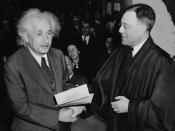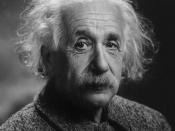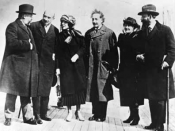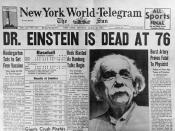History 202-06 9 February 2001 Two People With A Common Obsession After reading Einstein's Dreams by Alan Lightman and Fredrick W. Taylor and the Rise of Scientific Management by Daniel Nelson, Albert Einstein and Fredrick Taylor's differences become very distinct. Had the two men known each other, they probably would not have liked each other. Taylor would probably resent Einstein, but what would Einstein think about Taylor? The two men share some common characteristics, but have different ways of expressing such traits. Einstein and Taylor are both obsessed with time, influenced by sleep, and are highly intelligent. They differ, however, in their views of time, their reactions to sleep, and in business etiquette.
The greatest contrast between Einstein and Taylor most likely was the distinct difference in their interpretations of time. Taylor was obsessed with the quantity of time and with efficiency. Even as an adolescent, he always counted and measured things to find a more efficient method.
Einstein, like Taylor, was also fascinated with time but was not concerned with efficiency. According to Lightman, Einstein was more focused on the conceptualization of time. A new scenario formed each day and time gained a new characteristic. "Suppose time is a circle, bending back on itself"ÃÂ (Lightman 8). "A world in which time is absolute is a world of consolation. For while the movements of people are unpredictable, the movement of time is predictable. While people can be doubted, time cannot be doubted"ÃÂ (Lightman 37). "Suppose that time is not a quantity but a quality, like the luminescence of the night above the trees just when a rising moon has touched the treeline"ÃÂ (Lightman 123).
Einstein's Dreams takes place while Einstein is asleep on his job. If Taylor were his manager, he would probably not appreciate seeing Einstein asleep, and Einstein would likely be unemployed by this time. Taylor would most likely be very jealous to see Einstein sleeping so well, introducing another contrast. Daniel Nelson states the following concerning Taylor's inventive nature: Taylor's early inventions were ad hoc responses to problems that arose in his daily activities. They revealed an inquiring mind, mechanical aptitude, tenacity, and a tendency, which became pronounced in later years, to assume that personal and social problems were amenable to better organization and improved mechanical devices.
Taylor's discomforts provided sources of inspiration for his inventions. "In addition to athletic equipment-a special bobsled brake, for example-he developed gadgets to help overcome nightmares and insomnia, two seemingly persistently afflictions from which he suffered"ÃÂ (Nelson 24).
Taylor performed each task systematically and methodically in order to operate in a smooth and organized manner. "Two distinctive features of Taylor's system were the bulletin board and written orders or instruction cards, innovations that struck at the foreman's traditional prerogatives of scheduling work and determining the method of production"ÃÂ (Nelson 40). Einstein, in this sense, completely contradicted everything that Taylor represented. Einstein took little pride in his personal appearance and had no sense of organization. "His hair is uncombed and his trousers are too big. In his hand he holds twenty crumpled pages, his new theory of time, which he will mail today to the German journal of physics"ÃÂ (Lightman 3). Even Einstein's dreams were unorganized, as the novel perfectly demonstrates.
Taylor and Einstein shared several similarities including a common obsession, inspiration resulting from dreams, and astounding intellectual ability. Despite their similarities, however, Taylor and Einstein had completely opposite personality characteristics. Had the two men met in person, Taylor probably would not think very highly of Einstein, but what would Einstein think of Taylor? Would he think that Taylor were from the future, stuck in time, or living by mechanical time? Works Cited Lightman, Alan. Einstein's Dreams. New York, NY: Pantheon Books, 1992.
Nelson, Daniel. Frederick W. Taylor and the Rise of Scientific Management. Madison, WI: The University of Wisconsin Press, 1980.





